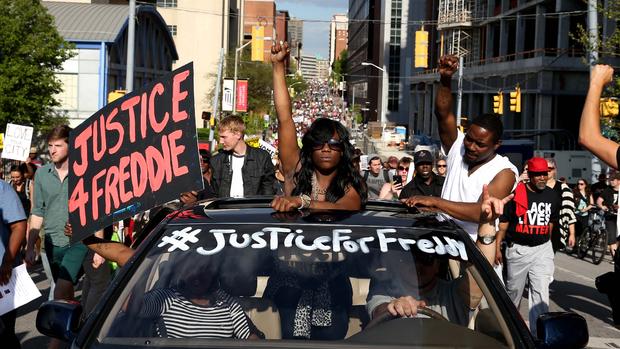Baltimore police turn over Freddie Gray case to prosecutor
BALTIMORE -- Baltimore police have completed their investigation into the death of Freddie Gray and turned over their findings to prosecutors - one day earlier than the department's self-imposed deadline, the commissioner said Thursday morning.
Authorities have said the state's attorney's office will review the information, consider charges and decide how to move forward in the death of Gray, who was stopped by police April 12. He suffered spinal injuries while in custody and died a week later.
In a statement, the state's attorney's office confirmed that it had received the police department's investigative file.
"We have been briefed regularly throughout their process while simultaneously conducting our own independent investigation into the death of Freddie Gray," said Marilyn J. Mosby, state attorney for Baltimore City. "While we have and will continue to leverage the information received by the Department, we are not relying solely on their findings but rather the facts that we have gathered and verified. We ask for the public to remain patient and peaceful and to trust the process of the justice system."
In his announcement at a news conference, Baltimore Police Commissioner Anthony Batts did not give details of the report or take questions. He said the department dedicated more than 30 detectives to working on the case and report.
"I understand the frustration; I understand the sense of urgency. ... That is why we have finished it a day ahead of time," Batts said.
Batts also said police would continue to work on the case at the direction of the state's attorney.
"This does not mean this investigation is over," Batts said.
At the same news conference, Deputy Commissioner Kevin Davis reviewed the timeline of Gray's time in custody and his death. Gray was arrested after he made eye contact with officers and ran. After a chase, officers pinned him down and handcuffed him. They loaded him into a van and put leg cuffs on him when officers said he became "irate" in the wagon.
Davis said Thursday that police discovered a new stop the van made with Gray in it, but they did not say what happened. Davis said the stop was found through footage from a privately owned camera.
At a later stop at the tail end of Gray's ride, police put another man in the van. He told investigators that Gray was "was still moving around, that he was kicking and making noises" up until the van arrived at the police station. Batts said the man also said the driver did not speed, make sudden stops of "drive erratically."
A Washington Post story quotes a prisoner transported in the same van as saying he could hear Gray "banging against the walls" and believed that he "was intentionally trying to injure himself." The other prisoner couldn't see Gray, however, as the back of the van was divided by a partition.
Somewhere along the way, Gray suffered a fatal spinal injury. He was eventually taken to a hospital. He died a week later.
The six officers involved were suspended with pay amid the criminal investigation.
Speaking to "CBS This Morning" on Thursday, Mayor Stephanie Rawlings-Blake said the city needs to "make sure that there is justice for Freddie Gray and for his family."
"We have to protect the process. Yes, they want answers, but they want answers in a way that will be protect their ability to get justice for Freddie Gray," she said.
On Wednesday, rumors circulated that some kind of "verdict" would be rendered when police handed their report to prosecutors. But Rawlings-Blake and other officials worked to dispel that notion.
"It became very clear ... that people misunderstood," Rawlings-Blake said.
Hassan Murphy, a lawyer for Gray's family, underscored their comments, saying, "This family wants justice and they want justice that comes at the right time and not too soon."
Said Rawlings-Blake: "Whatever time the state's attorney's office needs to make that determination, the family wants to get it right."
In widespread protests Wednesday night - not only in Baltimore, but in several cities including Boston, New York and Washington, D.C. - it was clear that tensions over the case are far from subsiding.
While the demonstrations were mostly peaceful, police made numerous arrests, including 16 in Baltimore and at least 60 in New York.
Gray's death was the latest in a series of high-profile cases around the country in which black men have died as the result of encounters with police.
Similar protests have erupted over the deaths of Michael Brown in Ferguson, Missouri, and Eric Garner in New York last year, and the death earlier this month in South Carolina of Walter Scott. Scott was fatally shot in the back by a white police officer who has since been charged with murder.
